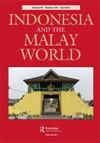一个我可以称之为我自己的地方
IF 0.9
3区 社会学
0 ASIAN STUDIES
引用次数: 3
摘要
摘要本文通过分析伊斯梅尔小说《无怨无悔》中的中心马来男同性恋角色,探讨马来西亚酷儿“家”的意义。本文借鉴了女权主义者和酷儿地理学家对家的研究,考察了角色对“家”的概念,以及这些概念是如何跨越时间和空间构建的。研究结果表明,“家”的概念有很多:(1)物质想象空间;(2) 身份和权力的场所;以及(3)多标量构造。这个角色在一生的大部分时间里都在探索家的过程中,通过这个过程,他产生了一种奇怪的“家”感和身份认同感。然而,这并不是一项容易的任务,因为家是一个强大的网站,既可以促进过程,也可以使过程复杂化。本文章由计算机程序翻译,如有差异,请以英文原文为准。
A Place I Could Call My Own
ABSTRACT This article explores the meanings of ‘home’ for queer Malays in Malaysia through an analysis of the central gay Malay male character in Azwan Ismail’s story, Tiada sesalan (No regrets). Drawing upon studies of home by feminist and queer geographers, the article examines the character’s notions of ‘home’ and how these notions are constructed across time and space. The findings show that ‘home’ has been conceived of in many ways: as (1) a material-imaginative space; (2) a site of identity and power; and (3) a multi-scalar construct. The character has, for the most part of his life, been engaged in the process of queering home through which he developed a queer sense of ‘home’ and identity. This, however, has not been an easy task because the home is a powerful site that can both facilitate and complicate the process.
求助全文
通过发布文献求助,成功后即可免费获取论文全文。
去求助
来源期刊

Indonesia and the Malay World
ASIAN STUDIES-
CiteScore
2.00
自引率
0.00%
发文量
17
期刊介绍:
Indonesia and the Malay World is a peer-reviewed journal that is committed to the publication of scholarship in the arts and humanities on maritime Southeast Asia. It particularly focuses on the study of the languages, literatures, art, archaeology, history, religion, anthropology, performing arts, cinema and tourism of the region. In addition to welcoming individual articles, it also publishes special issues focusing on a particular theme or region. The journal is published three times a year, in March, July, and November.
 求助内容:
求助内容: 应助结果提醒方式:
应助结果提醒方式:


